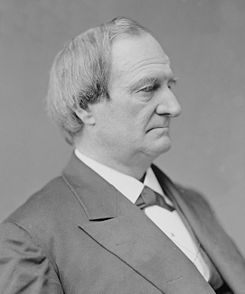Alphonso Taft
| Alphonso Taft | |
|---|---|
 |
|
| 31st United States Secretary of War | |
|
In office March 8, 1876 – May 22, 1876 |
|
| President | Ulysses S. Grant |
| Preceded by | William W. Belknap |
| Succeeded by | J. Donald Cameron |
| 34th United States Attorney General | |
|
In office May 22, 1876 – March 4, 1877 |
|
| President | Ulysses S. Grant |
| Preceded by | Edwards Pierrepont |
| Succeeded by | Charles Devens |
| Personal details | |
| Born |
November 5, 1810 Townshend, Vermont, US |
| Died | May 21, 1891 (aged 80) San Diego, California, US |
| Political party | Republican |
| Spouse(s) | Fanny Phelps (1823-1852) Louise Taft (1827-1907) |
| Children |
Charles Phelps Taft (1843-1929) Peter Rawson Taft, II (1846-1889) William Howard Taft (1857-1930) Henry Waters Taft (1859-1945) Horace Dutton Taft (1861-1943) Frances Louise "Fanny" Taft (1865-1950) |
| Alma mater | Yale University |
| Profession | Lawyer, Tutor, Politician |
| Signature | |
Alphonso Taft (November 5, 1810 – May 21, 1891) was a jurist, diplomat, Attorney General and Secretary of War under President Ulysses S. Grant. He was also the founder of an American political dynasty, and father of President and Chief Justice William Howard Taft.
As Secretary of War, Taft reformed the War Department by allowing commanders at Indian forts to choose who could start and run post traderships. While serving as Attorney General, he strongly held that African Americans must not be denied the right to vote through intimidation and violence. Attorney General Taft coauthored a bill to Congress, signed into law by President Grant, that created the Elections Commission that settled the controversial Hayes-Tilden election.
In 1882 Taft was appointed as minister to Austria-Hungary by Chester A. Arthur in 1882. He served until July 4, 1884, and was then transferred by President Arthur to Minister of Russia in St. Petersburg and served until August, 1885. Taft had a reputation for serving political office with integrity and character.
Alphonso Taft was born in Townshend, Vermont, the only child of Peter Rawson Taft of the powerful Taft family and Sylvia Howard, on November 5, 1810. He was descended from Robert Taft who had migrated to America from England in 1640. His mother Sylvia was either of Scotch or Irish descent. While the Taft family was of substance and education, they were not considered wealthy. Taft attended local schools until the age of sixteen. He then taught school to earn money to attend Amherst Academy. Taft entered Yale College in 1829 and he graduated four years later in 1833. Taft helped create the secret society known as Skull and Bones in 1832 with William Huntington Russell.
Upon graduation, again to earn money, Taft was an instructor at Ellington, Connecticut from 1835 to 1837. He subsequently studied law at the Yale Law School and was admitted to the Connecticut bar in 1838. While studying law Taft held a tutorship at Yale. Taft had no desire to remain in New England, and he stated to his father Peter in a letter written on July 22, 1837 that Vermont was a "noble state to emigrate from." Taft did not want to practice law in New York because he believed people were under the corrupting influence of wealth. In 1839 Taft migrated to Cincinnati where he was a member of the Cincinnati City Council, and became one of the most influential citizens of Ohio. He was a member of the boards of trustees of the University of Cincinnati and of Yale College.
...
Wikipedia
